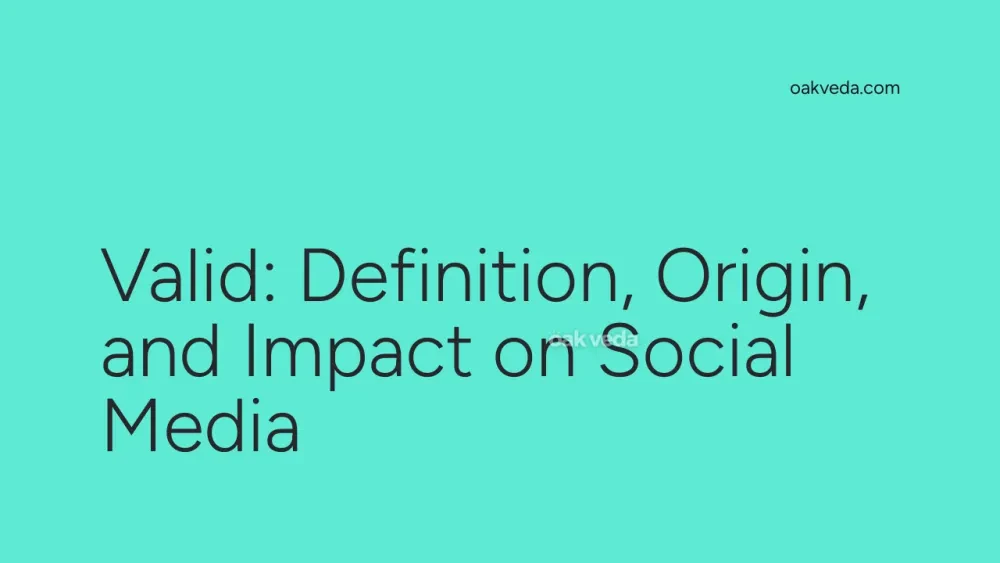
What is "Valid"?
In the context of social media, "valid" has evolved beyond its traditional dictionary definition. On platforms like Twitter, Instagram, and TikTok, "valid" is used to express agreement, understanding, or recognition of someone's perspective, experiences, or feelings. When a person describes something as "valid" or refers to someone as "valid," they are acknowledging the legitimacy or truthfulness of that individual's thoughts, emotions, or opinions.
Origin and Development of "Valid" in Social Media
The use of "valid" as a standalone affirmation in social media conversations has gained popularity over the past few years. While the exact origin is difficult to pinpoint, its widespread adoption can be attributed to the increasing focus on mental health, empathy, and inclusivity in online spaces.
As social media platforms became more personal and users began sharing vulnerable experiences, there arose a need for a concise way to show support and understanding. "Valid" filled this gap, offering a simple yet powerful means of validation.
How "Valid" Works in Online Communication
When someone uses "valid" in a social media context, they are essentially saying, "Your feelings/thoughts/experiences are legitimate and worthy of recognition." It serves as a shorthand for more elaborate expressions of empathy and understanding.
For example:
- User A: "I'm feeling overwhelmed by all the news lately."
- User B: "Valid."
In this exchange, User B is conveying that they understand and acknowledge User A's feelings without minimizing or questioning them.
Popular Examples of "Valid" Usage
- Affirming personal struggles: "Your anxiety about the pandemic is valid."
- Supporting marginalized voices: "Your experiences as a minority in the workplace are valid."
- Acknowledging unpopular opinions: "Not liking a popular TV show? Valid."
- Validating emotional responses: "Crying over a fictional character's death? Totally valid."
Impact of "Valid" on Social Media Culture
The widespread use of "valid" has contributed to fostering a more supportive and empathetic online environment. It has become a tool for:
- Promoting mental health awareness: By validating emotions, it encourages open discussions about mental health.
- Building inclusive communities: It helps create spaces where diverse experiences are acknowledged and respected.
- Simplifying complex interactions: "Valid" offers a quick way to show support without lengthy explanations.
- Encouraging vulnerability: Knowing their feelings will be validated, users may feel more comfortable sharing personal experiences.
Controversies Surrounding "Valid"
While generally positive, the use of "valid" is not without controversy:
- Overuse concerns: Some argue that excessive use of "valid" can dilute its meaning and impact.
- Misuse in serious situations: Critics worry that using "valid" might oversimplify complex issues that require more nuanced responses.
- Potential for dismissiveness: In some contexts, a simple "valid" might be perceived as dismissive or insincere.
How Brands and Influencers Use "Valid"
Savvy brands and influencers have incorporated "valid" into their social media strategies:
- Customer engagement: Brands use it to acknowledge customer complaints or feedback.
- Content creation: Influencers create relatable content around what is or isn't "valid" in their niche.
- Community building: By validating followers' experiences, brands and influencers foster stronger connections with their audience.
Future Trends Related to "Valid"
As social media continues to evolve, we can expect:
- Expanded usage: "Valid" may find its way into more formal communication channels.
- New variations: We might see spin-offs or related terms emerge.
- Integration with AI: Chatbots and AI assistants may incorporate "valid" to seem more empathetic and human-like.
- Cultural studies: Academic research may focus on the impact of validation language in digital communication.
FAQs about "Valid" in Social Media
-
Is saying "valid" the same as agreeing? Not necessarily. It's more about acknowledging the legitimacy of someone's feelings or experiences, even if you don't personally agree.
-
Can "valid" be used sarcastically? Yes, like many terms, it can be used sarcastically, though this isn't its primary use in supportive online communities.
-
Is "valid" appropriate in professional settings? While common in casual online interactions, it's less common in formal professional communication. Context is key.
-
Are there cultural differences in using "valid"? Yes, its usage and interpretation can vary across different online communities and cultures.
-
How can I use "valid" effectively in my social media interactions? Use it genuinely to show support and understanding, but be mindful not to overuse it or use it in place of more substantive responses when needed.
In conclusion, "valid" has become a powerful tool in social media communication, fostering empathy and support. As with any linguistic trend, its usage continues to evolve, reflecting broader shifts in how we interact and express ourselves in digital spaces. Understanding and appropriately using terms like "valid" can significantly enhance one's ability to navigate and contribute positively to online communities.
You may be interested in:
- RN: Definition, Origin, and Impact on Social Media
- Webinar: Definition, Origin, and Impact on Digital Communication
- Gucci: Definition, Origin, and Impact in Social Media Slang
- Lemon8: Definition, Origin, and Impact on Social Media
- KPIs in Social Media: Definition, Origin, and Impact
- Roman Empire Trend: Definition, Origin, and Impact

